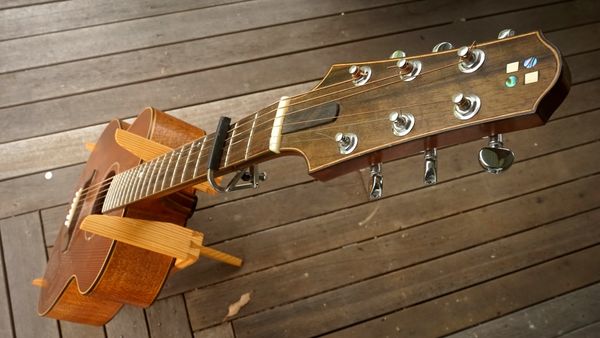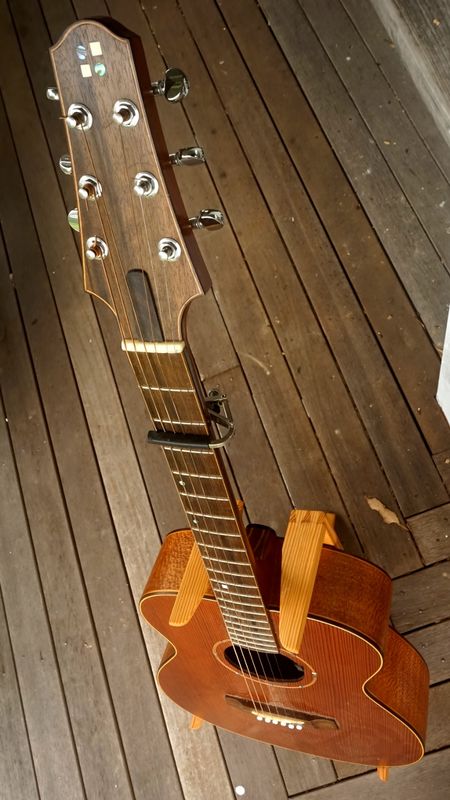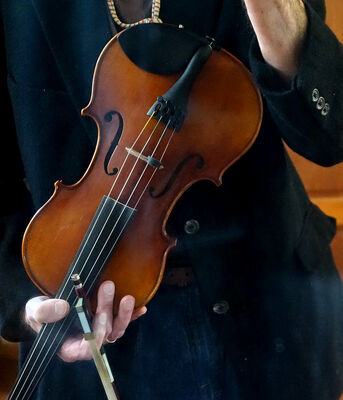Going Manual all the Way
Mar 21, 2017 10:33:27 #
Rloren wrote:
Like I tell my wife, my smart phone is a computer ... (show quote)
I just learned how to bend computers to my will. The rest was easy!
Mar 21, 2017 13:14:41 #
Brasspounder001
Loc: Erewhon
You can shoot manual on a DSLR, but it's still not really full manual because the image is still undergoing a considerable amount of processing. But nonetheless, using manual mode with an old manual lens is an excellent way to learn the rudiments of photography. It forces you to surrender a little convenience and slow down and think about what you're doing. I think everybody who is serious about photography should pick up an old manual film camera and lens and learn how to use it. After a week it's easy, and setting ISO, shutter speed and aperture become second nature. Where the "digital" part comes in is in the A to D conversion, colour balance, dynamic range and other things that take part in the camera's CPU.
Mar 21, 2017 13:20:02 #
Brasspounder001 wrote:
You can shoot manual on a DSLR, but it's still not really full manual because the image is still undergoing a considerable amount of processing.....
That could be debatable, with film the processing just happens in a different place, not in the camera excepting Polaroids and so on.
I do agree about manual lenses. I still have several film cameras and several manual lenses adapted to my DSLR. It does change the way one thinks about things.
Mar 21, 2017 13:29:48 #
Brasspounder001
Loc: Erewhon
Peterff wrote:
That could be debatable, with film the processing just happens in a different place, not in the camera excepting Polaroids and so on.
I do agree about manual lenses. I still have several film cameras and several manual lenses adapted to my DSLR. It does change the way one thinks about things.
I do agree about manual lenses. I still have several film cameras and several manual lenses adapted to my DSLR. It does change the way one thinks about things.
Yes it does, and there's something about using a nice old film camera and manual lens that adds an extra dimension of involvement and pleasure to photography that is hard to explain to someone who has never used one.
Mar 21, 2017 13:56:18 #
Rloren wrote:
Like I tell my wife, my smart phone is a computer ... (show quote)
The question is: can you live with the quality of the shots you are getting - and do you understand why you are only getting shots of that quality.
I am all for getting off Full Auto HOWEVER, taking a shot at full auto and then trying other settings and comparing the results will teach you about your camera more quickly and less stressfully than plodding through trial and error.
Photography is a difficult art. A personal journey of learning What and How you like to record life. You need the happiness of getting a successful image (by any means possible) to counter the shots you mess up. You can only be confident that you are doing things right when you can create: The image you want; better than the camera takes the scene you pointed it at.
All those settings are there for a reason....Free to use. Learn WHY they are there.
Have fun
Mar 21, 2017 14:58:21 #
G Brown wrote:
The question is: can you live with the quality of ... (show quote)
Photography is a difficult art. Shooting in manual isn't difficult.
Mar 21, 2017 15:48:33 #
Brasspounder001 wrote:
You can shoot manual on a DSLR, but it's still not... (show quote)
When you save raw files in a digital camera, there is NO processing happening there. Only JPEGs get processed in the camera. While some cameras CAN process raw files to JPEGs *after* exposure, giving you a chance to fix problems right away, 99% of raw files are processed in a computer, much the same as film is processed in a lab. The raw data is the equivalent of a latent image on exposed color negative film. Yes, it has a JPEG preview embedded in it, but nothing says you have to pay attention to that (or should!). You can get any look you want from that raw data, given reasonable exposure. Latitude is close to +/- 2 stops. Additionally, you can "reprocess" the raw file any way you like, without ever changing the original data one iota. THAT is a huge improvement.
When you save a JPEG in a digital camera, you have a plethora of menu options that affect the look of that file. It's a lot like using slide film — a different set of menu options, plus white balance and ISO, is like a different emulsion. There's really no latitude (+1/3, -2/3 stop), and for optimal results, everything you do to control the outcome must be done *before* you press the shutter button. You CAN adjust JPEGs in post, but you lose some potential by using that workflow.
EVERYTHING about digital imaging has a direct parallel back to the film/optical/chemical world. We lost nothing in the digital revolution, other than hindrances. Does it look different? Only if you let it!
I used film from 1959 as a child until 2005 as a middle-aged adult. I worked in a school portrait lab for 33 years, in many different roles. I helped lead the switch from film to digital-based lab processes between 2000 and 2005, when most of it happened. That perspective convinced me that film will be like vinyl record albums, AM radio, printed books, magazines, and newspapers... a cult medium used by people who love the atomic nature of it. But the rest of us have moved to digital systems because we had to use them. The Internet connects us all, with images, text, graphics, audio, and video.
Mar 21, 2017 15:49:35 #
My photo instructor said if I see your camera on anything but manual and set to anything but RAW, you fail the course.
I honestly off of the top of my head dont know how to reset my camera to manual ...
I honestly off of the top of my head dont know how to reset my camera to manual ...
Mar 21, 2017 15:56:03 #
bdk wrote:
My photo instructor said if I see your camera on anything but manual and set to anything but RAW, you fail the course.
I honestly off of the top of my head dont know how to reset my camera to manual ...
I honestly off of the top of my head dont know how to reset my camera to manual ...
If you can read your manual, you can reset the camera to manual.
Most cameras have a dial on top that says, "PASM" or "APAvTvM. In both cases, 'M' is manual exposure mode.
If you can adjust the focus mode on your camera, there will be a way to turn off autofocus (switch, button, or menu option), and there's probably a switch or menu to choose one of several autofocus MODES.
Mar 21, 2017 15:56:33 #
bdk wrote:
My photo instructor said if I see your camera on anything but manual and set to anything but RAW, you fail the course.
I honestly off of the top of my head dont know how to reset my camera to manual ...
I honestly off of the top of my head dont know how to reset my camera to manual ...
Your instructor is not necessary right but you do fail the course.
Mar 21, 2017 15:59:59 #
Nothing wrong with going all manual. Even if it's not your thing, spending sometime that way may help you understand what the auto modes are supposed to do.
Manual focus through a DLSR viewfinder and be tough. The film SLRs had split screen and other aids. They has their shortcomings but unless you have perfect vision or always going for maximum DOF manual focus with a DSLR viewfinder can be frustrating. However, if you are using a tripod manual focus with live view (& patience & dilberation) works pretty good.
Manual focus through a DLSR viewfinder and be tough. The film SLRs had split screen and other aids. They has their shortcomings but unless you have perfect vision or always going for maximum DOF manual focus with a DSLR viewfinder can be frustrating. However, if you are using a tripod manual focus with live view (& patience & dilberation) works pretty good.
Mar 21, 2017 17:04:27 #
BebuLamar wrote:
Photography is a difficult art. Shooting in manual isn't difficult.
The poster suggested that he was learning how to take photographs and had decided to only use manual. In which case he is juggling at least 3 variables in every situation, every time. That is not the best way to learn the capabilities of your camera. Add all the rest of the things he has to get right and he is setting himself up to be frustrated.
Photography isn't difficult...you either follow other people's advice (With different cameras and lenses and varying skills) or learn how to do what you want with the camera that you have. The camera modes and pre-sets simply point you in the various selective directions to explore (focus, movement and light) The KISS principle.
have fun
Mar 21, 2017 20:34:19 #
Sorry, I meant to italicize the word photography. The quote was "Life"..., so shoot me. I thought this was a photography site, not an English class. Happy!
Mar 21, 2017 21:25:22 #
I want a lot of DOF to shoot instruments and furniture. Not so much for a straight on shot but for an angled shot. I've tried aperture priority but manual works best for this situation. The ISO is still on auto.
I just took this out on the veranda. 1/60 - f16 - ISO 1000. Sony 28-70mm kit lens. The guitar is a little dusty, it's always out. I'm considering some primes, any suggestions?
I just took this out on the veranda. 1/60 - f16 - ISO 1000. Sony 28-70mm kit lens. The guitar is a little dusty, it's always out. I'm considering some primes, any suggestions?


Mar 21, 2017 21:31:23 #
DavidPine
Loc: Fredericksburg, TX
I don't think just shooting manual is the answer. I shoot mostly manual and I also shoot aperture priority and shutter speed priority. There's a good book by Bryan Peterson — Understanding Exposure. I highly recommend it.
Rloren wrote:
Like I tell my wife, my smart phone is a computer ... (show quote)
If you want to reply, then register here. Registration is free and your account is created instantly, so you can post right away.





